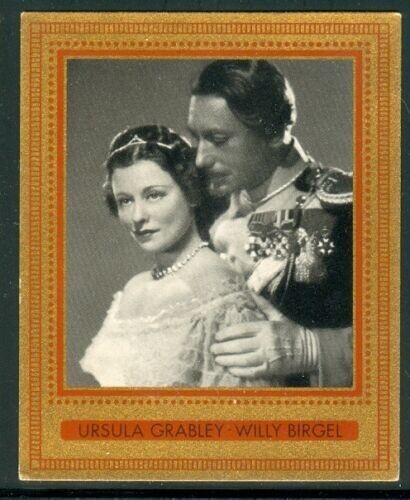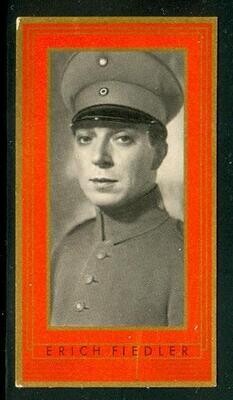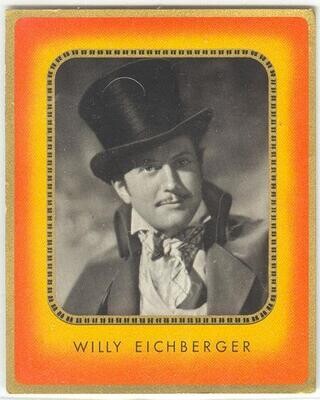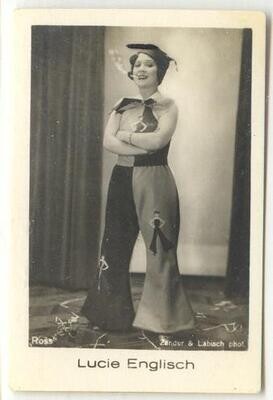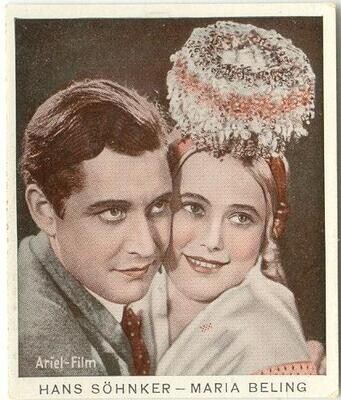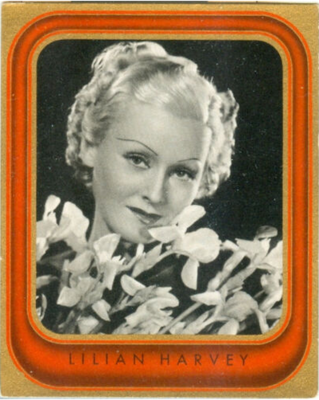
1937: Ursula Grabley & Willy Birgel, vintage Filmbilder cigarette card #298
Ursula Grabley & Willy Birgel ~ This card is from the Bunte Filmbilder series from 1937. Card is #298 in excellent condition, VF. About 2¼"x2¾".
Ursula Grabley (1908-1977) was an up-and-coming German comedic actress until she fell afoul of propaganda minister Joseph Goebbels in 1939 and was banished from film for the remainder of the Nazi era. Still able to perform on the stage, Grabley survived the Nazi era and the, seemingly, the usual five year ban suffered by performers perceived as being sympathetic to the Nazi cause to return to film in 1950 and on to television in the 1960s.
Willy Birgel (1891-1973) began his acting career before World War I on the stage in his native Cologne and came to movies rather late. He was about 43 years old before he got his first major film role as the English Camp Commandant in Paul Wegener's Ein Mann will nach Deutschland (roughly translated A German Wants to Get to Germany or A German Wants to Go Home). This UFA-production that premiered on 26th July 1934, portrays a German engineer living in South America who hears in 1914 of war in Europe. Realizing his obligation for his fatherland, he sets out for Europe, joined by a German comrade. The journey to Germany involves physical hardships, treacherous terrain, and hostile seas, obstacles faced by patriots who have only one thought: home to Germany to help a fatherland under attack. The film spoke of the kind of German values that were emphasized in Nazi Germany.
Similar films made by Birgel for the NS-Regime include Unternehmen Michael (1937), Feinde (1940) and Kameraden (1941). In 1937, Reichspropagandaminister Joseph Goebbels named Birgel Staatsschauspieler or roughly Actor of the State, the highest honor Germany had for actors at the time. Besides the propaganda films, Birgel starred in a number of popular movies becoming an unlikely public favorite.
After World War II, Birgel was on the Allied black-list and did not make another film until 1947. By the 1950s, he was back to his pre-war popularity, often appearing with German film superstar Hans Albers. In the 1960s, Birgel was able to transition to television. Willy Birgel died 1973 of heart failure. He was buried at the Melaten Cemetery in his birth city, Cologne.
This lot consists of a genuine German cigarette premium issued between about 1930 and 1937. In general, German cigarette cards and premiums make an interesting and inexpensive addition to any collection. The Nazi government of Germany opposed smoking and eventually put an end to cigarette cards. As a result, the native German card collecting hobby never developed to the extent of that in Britain or the United States. As a result, most German premiums and cards cost only a fraction of what might be expected from their American and British cousins.
Large photos are shown smaller than actual size while small ones are generally enlarged to as much as twice their original size. Almost all photos and cards are scanned through protective sleeves or pages which tends to cut the clarity a bit. Enlarged defects tend to look worse than they actually are.
